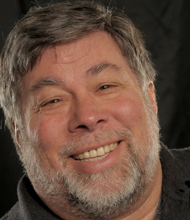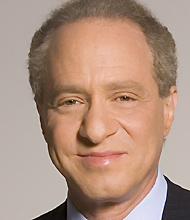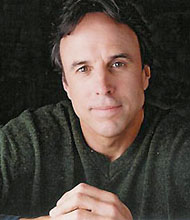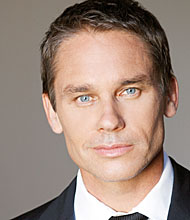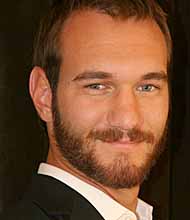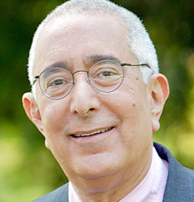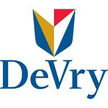| TRAVELS FROM |
|
SPEAKING FEE RANGE ** Please note that while this speaker’s specific speaking fee falls within the range posted above (for Continental U.S. based events), fees are subject to change. For current fee information or international event fees (which are generally 50-75% more than U.S based event fees), please contact us. $50,000 to $75,000 |
|
BOOK LISA BODELL speakers@coreagency.com |
| TRAVELS FROM |
|
SPEAKING FEE RANGE* $50,000 to $75,000 |
|
Book Lisa Bodell speakers@coreagency.com |
- Bestselling author of Kill the Company and Why Simple Wins.
- Global council member of the World Economic Forum, and CEO of Futurethink.
- Through her work with and study of the culture of thousands of companies, innovation and change expert Bodell has learned the most effective way for organizations to innovate, and how transformational change really happens.
- Bodell’s thoughtful insights, humor and audience-engaging keynotes reflect her and her company’s years of research on corporate culture and its impact on innovation and change.
Lisa Bodell knows organizations want—and need—to be innovative, but when it comes to the “change” part, they often get stuck. Bodell is founder and CEO of futurethink, which has helped more than 6,300 organizations in 40 countries embrace change to become world-class innovators. Since 2003, Bodell and her futurethink team have empowered organizations and companies—even those in highly regulated industries—to solve big problems in transformative ways.
A recognized futurist and innovation and change expert, Bodell ignites new thinking with humor, energy and lots of audience engagement in her workshops and keynotes. Through her message, she has inspired nearly 100,000 people each year in more than 30 countries.
Bodell is the author of the best-selling book Kill the Company: End the Status Quo, Start an Innovation Revolution, which won the 2014 Axiom Best Business Book Award and was voted Best Business Book by USA Book News and Booz & Co. Her newest book Why Simple Wins; Escape the Complexity Trap and Get to Work That Matters provides readers with a simplification method that helps them move beyond the futility of unproductive work to create a culture where valuable, essential and meaningful work is the norm.
She is a global council member of the World Economic Forum and an advisor on the boards of the Association of Professional Futurists and Novartis’ Diversity and Inclusion Board in Basel, Switzerland. Bodell has taught innovation and creativity at both American and Fordham Universities, and has appeared on NPR, FOX News, and in Fast Company, The New York Times, and WIRED. She is a frequent contributor to strategy+businesss, Forbes and Harvard Business Review.
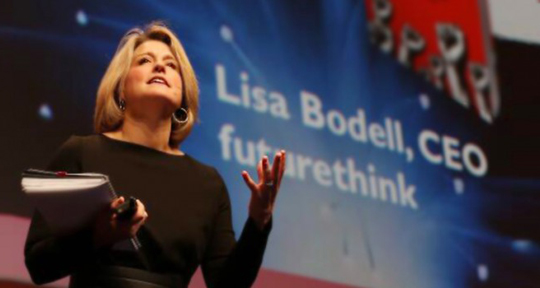 I want to inspire people to create change; change that they truly desire. I want to inspire people to create change; change that they truly desire. | |
| |
 | What do you want people to learn from your presentations? |
 | I want to inspire people to create change; change that they truly desire. Not just encourage change for shareholder value, but also really create change that simplifies their lives, simplifies their work, and simplifies things to give more value to a customer. My goal is to provide inspiration and give people simple things they can use. |
 | What kind of special prep work do you do prior to an event? And how do you prepare for your speaking engagement? |
 | I love to speak. If I could be in front of Madison Square Garden every day, I would just be the happiest person on earth. But I customize all my talks. What I mean by that is I really want to understand the industry because when I go in, right off the bat, I play a game with people and I try and see how well they can determine the change in their industry.
I present some headlines from the future that may or may not be true. And by doing that, by getting people engaged in the content of statements like, "Wow, is that artificial intelligence thing in insurance really true?" or "Is that medical device in my home really true?" I can better uncover trends by doing it in the game aside way. I customize all my talks right up front and make them really interactive. The other thing I do is I concentrate on who is in my audience, not from a demographic standpoint, but frankly, an emotional standpoint. I know, as a speaker, it's not what I tell them, it's how I make them feel. If they leave my speech not just learning something new and giving them something practical, that's fine. I'd rather have them say, they felt empowered.
Frankly, I try to make them feel a little uncomfortable, because I think that agitation creates change and that they were inspired by my words to do it. Those things make me very happy. |
| The organizations that benefit from my message are those that are the antithesis of fostering change. They are global multinational companies, they're complex, they're established, so, they have that status quo, and they are very regulated. | |
| |
 | What types of audiences would most benefit from your message? |
 | The organizations that benefit from my message are those that are the antithesis of fostering change. They are global multinational companies, they're complex, they're established, so, they have that status quo, and they are very regulated. The good news is, because change is hard and people like simple tools to really disrupt things, even small businesses like the message. But I think my message particularly resonates with the large, complex, big Fortune 500 companies, because they don't know how to do it. And my approach is kind of revolutionary to them. |
| My talks that help people discover the future through change. I love talking about 'killing the company,' because that's about how you actually get rid of things and create change. | |
| |
 | Which keynote speaking topics are your favorite, and why? |
 | My talks that help people discover the future through change. I love talking about “killing the company,” because that's about how you actually get rid of things and create change. When I get to put my futurist hat on, because I'm a trained futurist, and I really get to structure their thinking about the future. This is not about what products you have, but whom you hire, and the future is not about who you are, but who you're becoming.
I show my audiences why and how change evolves over time, and it's never what they think, that's where I really get passionate, because people don't know how to think about change and the future, and I think I'm really good about bringing it down to their level, but showing it in creative ways. So I really dig talking about futurist stuff. |
 | What inspired you to start doing speaking engagements? |
 | Well, you're not going to believe this, but it was the Marlboro cowboys, and this is how this happened: I'm not a smoker, but I used to be in advertising and I worked on the Philip Morris brand, and it was my first account. And I used to go on shoots with the cowboys for different ways to do print and TV, film, then we'd be there with the horse wranglers and we'd be on these ranches that were incredible, and we came back from one of the shoots and I had to present the TV ads with the cowboys to the executives at Philip Morris, and I had never given a presentation before. My boss, I could tell, was really nervous, but I got up there and it was that moment of, I knew when I was done that I was going to be a speaker somehow in my life because when I finished, and I think people were not expecting a 22-year-old to give that speech.
I was really passionate about it; about how things were done and how we brought all this creativity together, and the message it was sending and all this other stuff. I remember one of the cowboys came up to me after all and he said, "Y'all did really good." And so that was one of those moments where I realized, "I can really do this," and I never thought about it until that moment. |
"Lisa has the winning combination you look for in a keynote speaker – she is insightful, engaging and energetic. She was the top rated speaker at two Google events and inspired our audience to start an innovation revolution."
Google
“Lisa’s message will not only open your eyes to what’s happening in our world, but will also provide you the tools to be able to take action … Her energy is contagious.”
Cisco Systems
"Lisa’s message is incredibly relevant and compelling. I find her work to be thought-provoking, challenging and necessary given today’s complex and ever-changing business environment."
Accenture
"Lisa brought energy to the room of over 300 people and ignited a spirit of innovation across our Global Product Team. Our top session of the annual meeting."
MasterCard Worldwide
"Bodell made my leadership team think in new ways and helped us develop winning business ideas right in the room. My team now embraces innovation rather than fearing it."
Citigroup Corporate Investment Bank
"Lisa Bodell is one of the most dynamic and powerful keynote speakers our association has ever had. Her delivery, style, and expert content completely energized an audience of 500 and a breakout session of 50. She is incredibly successful at sizing up an audience and totally tailors her speech to address the needs and concerns of an industry."
National Association of Confectionery Dealers
At the beginning of her program, change expert and futurist Lisa Bodell plays a game with attendees to see how well they can determine the change in their industry. She presents some headlines from the future that may or may not be true to get people engaged in conversation about trends and how they might impact their business. She also focuses on who her audience is—not from a demographic standpoint, but from an emotional standpoint. Bodell believes if she can move them emotionally, not just give them information, they will leave empowered to do what they need to do next. And finally, she tries to make her audience feel a little uncomfortable. Bodell says a little agitation can create the desire to change, and they need that desire for change to stick.
Bodell's Interactive Keynote Presentations are designed to spark the imagination and address the unique needs of your audience. Topics include:
Why SIMPLE Wins: Escape the Complexity Trap and Get to Work That Matters
Imagine what you could do with the time you spend sitting in meetings and writing emails every day.
Complexity is killing companies' ability to innovate and adapt, and simplicity is fast becoming the competitive advantage of our time. Drawing on her work with global organizations and themes from her latest book, Why Simple Wins, Bodell inspires leaders and their teams to proactively move beyond the feelings of frustration and futility that come with so much unproductive work in today’s corporate world.
Bodell shares tools and takeaways on how organizations and individuals can eradicate complexity, and allow Simplicity to be their new operating system and North Star towards an innovative workplace culture.
Kill the Company: End the Status Quo, Start an Innovation Revolution
Winning innovators embrace change—do you? What holds you back from better innovating, every day?
In too many organizations, we’re stuck in the land of status quo. We’ve forgotten how to think differently, and lack the simple tools to solve problems creatively. The very structures put in place to help organizations grow are now holding us back. So, it’s time to Kill the Company! This keynote is an inspirational call to arms: to start a revolution in how we think and how we work.
The key lesson of this Keynote: if we want people to approach change differently, we have to change our approach. You will learn how simplification lets us achieve more and better innovate. This can reignite critical aptitudes such as curiosity, inquiry, creative problem solving, and more.
The Keynote will bring to life the concepts presented in Bodell’s book, Kill the Company:
- Everyone is a change agent.
- Change involves a toolkit, not a process.
- Little changes can create big impact.
Bodell will introduce tangible ways to ignite innovation through the dynamic yet simple exercises in the Kill the Company Toolkit, including Kill a Stupid Rule, Killer Queries, Impossible to Possible, and many more. You will leave this Keynote with ways to eliminate needless complexity with simple, inspiring ways to make innovation happen now!
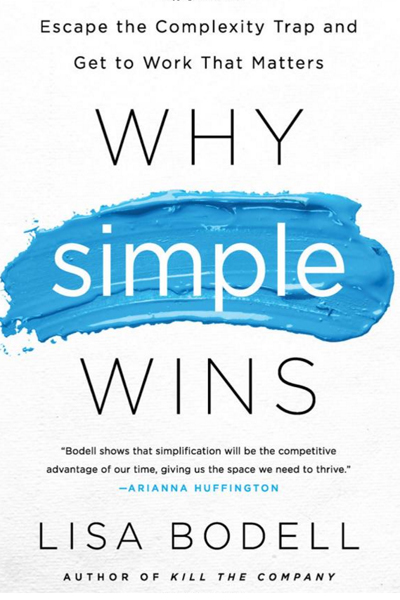
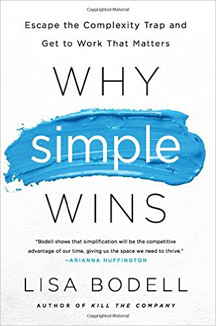
Why Simple Wins: Escape the Complexity Trap and Get to Work That Matters
Complexity is killing companies' ability to innovate and adapt, and simplicity is fast becoming the competitive advantage of our time. Why Simple Wins helps leaders and their teams move beyond the feelings of frustration and futility that come with so much unproductive work in today’s corporate world to create a corporate culture where valuable, essential, meaningful work is the norm. By learning how to eliminate redundancies, communicate with clarity, and make simplification a habit, individuals and companies can begin to recognize which activities are time-sucks and which create lasting value.
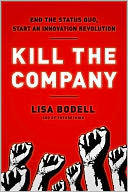
Kill the Company: End the Status Quo, Start an Innovation Revolution
In the ever-changing world of business, we′ve arrived at a point where process has trumped culture, where the race toward efficiency has made us complacent and unable to reach our potential. Stuck in the land of status quo, we′ve forgotten how to think. And the very structures put in place to help businesses grow are now holding them back. It′s time to Kill the Company.
This book is a call to arms: to start a revolution in how we think and work. But instead of more one-size-fits-all change initiatives forced upon employees, we need to embrace smaller, positive behavioral changes that create ripple effects throughout the organization. Thinking can no longer be exclusive to the creative team or lead strategists. Rather, a culture of curiosity must be fostered among the ranks to shake up our standard practices, from unproductive meetings to go-nowhere strategic planning. This revolution can and will awaken our ability to think, and ultimately, to innovate and grow.
In Kill the Company, innovation specialist Lisa Bodell urges companies to shift the mindset from business as usual to the company of the future, to move from what she calls "Zombies, Inc." to "Think, Inc." This involves both risk and trust: to allow all employees the opportunity and environment to be curious and inquisitive—even challenging and provocative when the situation calls for it. Too often, this type of behavior is seen as threatening, says Bodell, who has actually been told by CEOs that they discourage employees from thinking. In step with the call to Kill the Company, is a plea to kill fear, complacency, and the all-too-familiar answer from our leaders: "I can′t be bothered with your (perhaps brilliant) idea."
Bodell also looks at how we got to Zombies, Inc., exploring how our educational system contributes to the lack of inquiry and problem-solving skills, showing how conformity is rewarded early on. She also draws from the work of such education luminaries as Sir Ken Robinson and the groundbreaking Blue School (founded by members of the Blue Man Group).
In the end, readers of Kill the Company will have a full sense of how much riskier it is to stay here in the status quo than to break out and think.
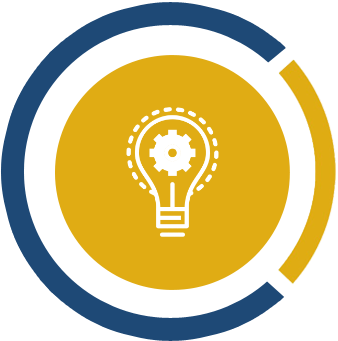
In this far-reaching interview, Lisa discusses:

 VIDEO
VIDEO TESTIMONIALS
TESTIMONIALS PROGRAMS
PROGRAMS SPEAKING
SPEAKING BOOKS
BOOKS INTERVIEW
INTERVIEW




